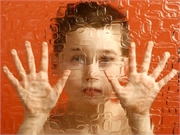- Could Your Grocery Store Meat Be Causing Recurring UTIs?
- Are You Making This Expensive Thermostat Error This Winter?
- Recognizing the Signs of Hypothyroidism
- 10 Strategies to Overcome Insomnia
- Could Artificial Sweeteners Be Aging the Brain Faster?
- Techniques for Soothing Your Nervous System
- Does the Water in Your House Smell Funny? Here’s Why
- Can a Daily Dose of Apple Cider Vinegar Actually Aid Weight Loss?
- 6 Health Beverages That Can Actually Spike Your Blood Sugar
- Treatment Options for Social Anxiety Disorder
Pandemic Can Overwhelm Those With Autism

The coronavirus pandemic can be especially difficult for children and adults with autism and their families, experts say.
Self-isolation and disruption of routine are tough for anyone, but may emotionally upend someone with an autism spectrum disorder, said Dr. Adrien Eshraghi, a professor and director of the University of Miami Hearing Research and Communication Disorders Laboratory.
The challenges autism patients and their families might face during the COVID crisis, and what health care providers should know to ensure appropriate care, are outlined in a letter published recently in The Lancet Psychiatry journal.
“The goal of this paper is to define the challenges these patients face in a pandemic like this, so physicians, caregivers and the overall health system can better anticipate and meet the needs of these particular patients,” lead author Eshraghi said in a university news release.
“At a time when everyone is stressed about contracting COVID-19, becoming better educated about how to manage patients with autism will increase patient and provider safely, while appropriately helping these patients and their families,” Eshraghi added.
People with autism are at higher risk for COVID-19 complications because they often have immune disorders and other health problems, according to the U.S. Centers for Disease Control and Prevention.
Self-isolation can be especially trying for children with autism and their families. These children might have difficulty comprehending the situation and expressing themselves, according to the paper.
Hyperactivity, behavioral issues and extreme sensitivity to sound or bright light are other issues experienced by people with autism.
If a youngster with autism requires medical care, the situation can overwhelm them and their families.
“The health care environment, especially in the emergency room, can be difficult and overstimulating for people with autism spectrum disorder possibly due to the crowd, sounds and lights,” Eshraghi said.
Currently, caregivers are not allowed into many ER exam and hospital rooms, but in the case of autism, patients need their caregivers to help keep them calm and facilitate communication with providers, Eshraghi explained.
ER staff should be trained to recognize the signs of autism and understand how to best manage these patients, Eshraghi said.
For example, if the patient is running around the hospital waiting room, it’s probably not a discipline issue, but rather the child is overwhelmed because of the environment.
“Another issue with people on the spectrum is that some don’t have a concept of having to wait for their turn, so they’re impatient when they have to wait,” Eshraghi said.
Also, while people should wear masks now, a child with autism might refuse or take off the mask because of sensory issues.
A possible solution is to have the child and parent wait in an exam room, rather than in the waiting room. If the child keeps taking off the mask, give parents additional masks to keep the child, parents and providers safe, the paper suggested.
Telehealth may be an option, but there’s a lack of telehealth services geared specifically toward people with autism, the authors said.
More information
The Autism Society has more on the coronavirus pandemic.
Source: HealthDay
Copyright © 2026 HealthDay. All rights reserved.










